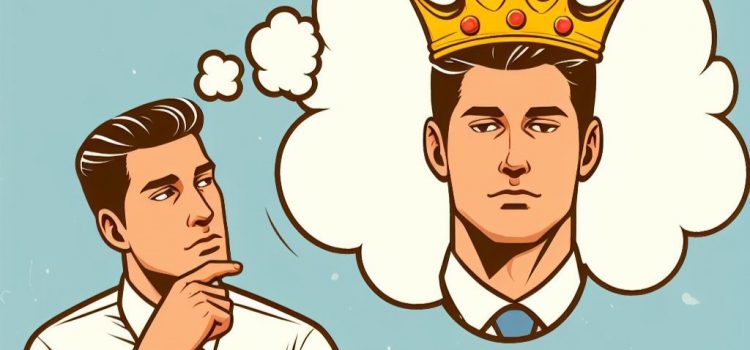
What is the King archetype? How does it explain the nature of the masculine psyche?
The King archetype is a way to think about the rational mind, especially in masculine people. Your internal King can be healthy or unhealthy depending on how you develop it.
Read on to learn more about this archetype and how you can apply it to your understanding of yourself.
The King: Order and Judgment
The King archetype is the part of the psyche that maintains mental balance and stability; it’s a person’s internal voice of reason. Someone with a healthy King aspect can stay calm and confident, and make good decisions in stressful situations.
When properly developed, the King keeps the other personality aspects in check and unleashes them only when appropriate. For instance, when it’s time to stop thinking and start acting, the King allows a man to rein in his Magician aspect and bring his Warrior aspect to the fore.
(Shortform note: As the “ruler” of the psyche, the King aspect could be seen as representing executive functions: a person’s ability to make decisions and plans, then carry them out. The term executive functions brings to mind the image of a CEO running his company—or, in this case, a king ruling his kingdom.)
In addition to maintaining order and making rational decisions, the King is responsible for passing judgment on others. This means that a good King recognizes and rewards deserving individuals. He does this not just by physically seeing other people but also by striving to deeply understand them, really care about them, and recognize their true worth.
For example, a CEO with a poorly developed King aspect might praise and promote the workers who put in the most hours (a superficial judgment), while a CEO with a strong and healthy King aspect would promote the people who are best suited for leadership: the ones whom other people like and respect, who make good decisions, who are happy working for that company, and so on.
(Shortform note: The benefits of recognizing and rewarding people when they do well have been known for millennia. In the Analects, Confucius advises leaders to reward their best subordinates in order to keep them loyal and keep their morale up. However, this principle doesn’t just apply to leaders; showing sincere appreciation for family and friends is rewarding both for the person who gives a compliment and the person who receives it. In fact, some modern studies have shown that people respond to being “paid” a compliment in much the same way they respond to being paid with money.)
The Immature King: the Divine Child
It’s a common misconception that growing up means getting rid of boyhood aspects of the psyche and replacing them with the four mature, masculine ideals. In reality, it’s impossible to eliminate any aspect of someone’s personality. Instead, as a man matures, he should view the boyish aspects of his psyche as foundations to build upon.
(Shortform note: According to Jung, psychological aspects come from what he calls the collective unconscious—beliefs and thought patterns that everyone is born with. In other words, these aspects are hardwired into people, so trying to get rid of them would be like trying to get rid of the instinct to pull away from a hot stove.)
The first of these immature aspects is the Divine Child. Whereas the fully developed King takes charge and makes decisions to help a man reach his full potential, this undeveloped aspect represents the man’s unrealized potential. The Divine Child is the part of the psyche that determines what someone wants to do or thinks he can do—but, in this immature state, it doesn’t have enough power to turn those wishes into reality.
The Imbalanced King: Oppression and Surrender
While an immature personality aspect can stop someone from living up to his potential, it’s not inherently harmful. However, each aspect can become harmful if it’s developed incorrectly, such that it’s out of balance with the rest of the person’s psyche, or its abilities are used improperly; some call this a shadow.
(Shortform note: Jung used the term shadow to describe the parts of someone’s personality that they keep hidden from others, and often even from themselves. In other words, the shadow consists of those things that a person is in denial about. For example, someone who has violent impulses but represses them—rather than acknowledging them and trying to understand where they come from—is making those impulses part of their shadow. Traditionally, then, the shadow is the opposite of the persona, which refers to a person’s self-image and the image they project to others. However, some have adapted the term to mean a dark or “evil” version of another archetype.)
Each aspect of the psyche exists on a spectrum, with the fully developed and healthy form of that aspect near the middle. That means each aspect can be imbalanced in two different ways, as it moves too far toward one end of the spectrum.
The Oppressor
At one extreme of the King’s spectrum is the Oppressor. The authors explain that an Oppressor has authority, but lacks the calm confidence of a good King. The thing he fears most is losing his power over others. Because of that fear, he sees everything as a threat to his power, and he is utterly ruthless in crushing those perceived threats.
In the Oppressor’s mind, the greatest danger to his authority is the limitless potential of his children. He’s afraid that they’ll humiliate him by surpassing his accomplishments, and undermine his power as they grow up and stop listening to him.
As a result, the Oppressor tries to overpower his family and force them into line by any means necessary. For example, he belittles their interests and accomplishments in order to destroy their confidence; he also quickly resorts to verbal, emotional, and sometimes physical abuse if he even suspects that a family member is defying his will.
(Shortform note: The Oppressor is the stereotypical abusive father, but this behavior isn’t limited to men. The book I’m Glad My Mom Died is the memoir of former child star Jennette McCurdy, who describes how her mother Debra controlled every part of her life using abuse and emotional manipulation. For instance, as the Oppressor, Debra would fly into a rage in response to even small mistakes like Jennette spilling some milk. The psychological damage from this abusive upbringing affected Jennette for many years, including long after Debra had died.)
Someone with a strong Oppressor aspect is also extremely sensitive to criticism. He’ll become scared and disheartened at the slightest suggestion that he’s failing as a leader, a worker, a father, or a man. However, instead of showing those “weak” emotions, he’ll hide them behind rage.
(Shortform note: The Oppressor’s most obvious trait is anger, but that anger is actually hiding his fear. Some studies show that this is a common trend: When someone feels afraid, they quickly jump to anger in order to protect themselves and gain control over whatever they’re afraid of. In fact, we’ll see throughout this guide that many of the imbalanced aspects represent unhealthy responses to fear.)
The Abdicator
At the opposite end of the spectrum is the Abdicator. While the Oppressor fights desperately to hold onto his power, the Abdicator willingly gives away his authority. He allows others to make decisions for him and passively submits to their whims because he’s afraid to take responsibility for his own life. In fact, someone with a strong Abdicator aspect often seems to have no desires or interests of his own and completely devotes himself to doing what other people want.
(Shortform note: The Abdicator lets other people take control because he’s afraid of taking responsibility, but this is a fatally flawed strategy. As Mark Manson says in The Subtle Art of Not Giving a F*ck, people are always responsible for their decisions, even if that decision is simply to let someone else decide. This means that, if someone makes a bad choice on the Abdicator’s behalf, the Abdicator still shares in the responsibility for it. Or, in the words of the rock band Rush, “If you choose not to decide, you still have made a choice.”)
However, the Oppressor and the Abdicator aspects frequently co-rule in an unbalanced psyche. The rageful Oppressor is often a cover for the fearful Abdicator; for instance, someone who’s afraid to take responsibility for his own decisions might seek out people to blame and punish for anything that goes wrong. Alternatively, an Abdicator who gets into a position of authority—such as by becoming a manager or a father—could quickly turn into an Oppressor as he revels in using and abusing his newfound power.
(Shortform note: We previously discussed how the immature King could be a result of childhood trauma such as emotional neglect; the same holds true for these imbalanced forms of the King. These aspects could represent people, like those Walker describes in Complex PTSD, who have gotten stuck in a trauma response. Trauma responses are defense mechanisms against danger (real or imagined), and are often called the Four Fs: Fight, Flight, Freeze, and Fawn. The Oppressor represents a fight response—trying to overpower and “defeat” the threat—while the Abdicator represents a freeze response: doing nothing in hopes that the threat will overlook them.)






